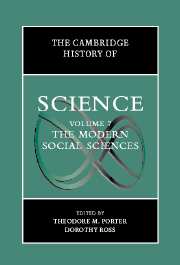Book contents
- Frontmatter
- 1 Introduction: Writing the History of Social Science
- PART I SCIENCES OF THE SOCIAL TO THE LATE NINETEENTH CENTURY
- PART II THE DISCIPLINES IN WESTERN EUROPE AND NORTH AMERICA SINCE ABOUT 1880
- PART III THE INTERNATIONALIZATION OF THE SOCIAL SCIENCES
- 22 The Sciences of Modernity in a Disparate World
- 23 The Social Sciences in Latin America during the Twentieth Century
- 24 Psychology in Russia and Central and Eastern Europe
- 25 Sociology in Egypt and Morocco
- 26 The Social Sciences in Africa
- 27 The Social Sciences in India
- 28 The Social Sciences In China
- 29 The Social Sciences in Japan
- PART IV SOCIAL SCIENCE AS DISCOURSE AND PRACTICE IN PUBLIC AND PRIVATE LIFE
- Index
- References
27 - The Social Sciences in India
from PART III - THE INTERNATIONALIZATION OF THE SOCIAL SCIENCES
Published online by Cambridge University Press: 28 March 2008
- Frontmatter
- 1 Introduction: Writing the History of Social Science
- PART I SCIENCES OF THE SOCIAL TO THE LATE NINETEENTH CENTURY
- PART II THE DISCIPLINES IN WESTERN EUROPE AND NORTH AMERICA SINCE ABOUT 1880
- PART III THE INTERNATIONALIZATION OF THE SOCIAL SCIENCES
- 22 The Sciences of Modernity in a Disparate World
- 23 The Social Sciences in Latin America during the Twentieth Century
- 24 Psychology in Russia and Central and Eastern Europe
- 25 Sociology in Egypt and Morocco
- 26 The Social Sciences in Africa
- 27 The Social Sciences in India
- 28 The Social Sciences In China
- 29 The Social Sciences in Japan
- PART IV SOCIAL SCIENCE AS DISCOURSE AND PRACTICE IN PUBLIC AND PRIVATE LIFE
- Index
- References
Summary
This chapter traces in outline the history of the modern social sciences in India from the late eighteenth century to the present. It begins with an account of the “discovery” of India by the European Enlightenment, which created the field of Indological studies. It then describes the practices of the modern disciplines of social knowledge in India in their relation to the institutions of governance created under British colonial rule and thereafter to the project of the Indian nationalist movement. The final section deals with the professionalization of the disciplines during the postcolonial period. The focus is on the disciplines of history, economics, sociology, social anthropology, and political science.
COLONIAL ORIGINS
The decisive event in the early institutional history of modern social knowledge in India was the founding of the Asiatic Society of Bengal in Calcutta in 1784 at the initiative of William Jones (1746–1794), an official of the East India Company and a major linguist of his time. For almost a century, the Asiatic Society was the chief institution in India for encouraging, organizing, and propagating knowledge about the country’s history, philosophy, religion, language, literature, art, architecture, law, trade, and manufacture. Most European scholars who worked in India were associated with the Society. They helped to establish Indological scholarship as a specialized field in the world of modern learning.
- Type
- Chapter
- Information
- The Cambridge History of Science , pp. 482 - 497Publisher: Cambridge University PressPrint publication year: 2003
References
- 6
- Cited by

